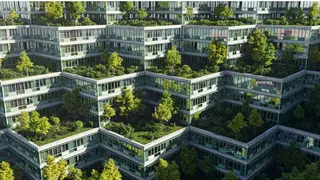Vishnu ‘kaka’ has witnessed the fall in his catch of fish for about two decades now. Having gone fishing for about 50 years, he laments that plastics and ‘acid’ or pollutants from factories in the vicinity pollute the creek, their only source of livelihood.
A resident of the Versova Koliwada, 62-year-old Vishnu Hegde says that fisherfolk’s earnings have dropped from about ₹20,000 a month to ₹5,000, as plastic garbage and pollutants destroy the fish and mangroves in the area.
It’s here that a recent installation at the Versova–Malad creek (Mumbai), hopes to make a difference. A traditional ‘dol’ net used for fishing is used instead to filter out plastic and in just three days the net filter caught 500 kg of solid waste from just one of the creek outlets (Kavtya Khadi). The creek has 12 such outlets.
The community-led ‘New Catch in Town’ pilot project was undertaken by Bombay61 Studio (B61)–an urban solutions think tank, the Ministry of Mumbai's Magic (MMM)–a collective that channelises youth to engage in solutions for a sustainable city and the TAPESTRY project that looks to bring about transformational change through solutions from people in the marginal environments.
The idea of catching plastic with a net may not be entirely new, but the good part here is the involvement of the indigenous community, and the use of their traditional skills and generational knowledge, say veteran voices working on sustainable solutions.
The Koli community have been integral to Mumbai, but pollution has hit the quality of their life and livelihood, says MMM’s Harpreet Bhullar. On the project’s initial impact in restoring the creek’s health, she says, the estimate is that net filters can clean 5,000 kilograms of waste in a month. And from the Malad creek, around 24,150 kg could be cleared if net filters were installed at multiple outlets of the creek.
Stop pollution at source
B61’s Ketaki Bhadgaonkar points to the mangroves destruction that has also hit marine life. People think the Kolis generate the waste, when in fact, they are affected by it, says B61’s Jai Bhadgaonkar. A clean-up is not the solution, the garbage needs to be caught at source, he adds. People need to stop seeing waterways as a ‘nallah’ (drain) he says, urging the municipality and corporates to support scale up of their inexpensive solution to more waterbodies.
Veteran environmental voice Debi Goenka, Executive Trustee, Conservation Action Trust, observes that 90 per cent of the problem can be solved by stopping pollutants at source. The municipality could help by having a mechanism to take recycled plastic to the marketplace, he added.
Vishnu Kaka too is hopeful that government agencies will step in to help restore the creek, and their livelihood.









Comments
Comments have to be in English, and in full sentences. They cannot be abusive or personal. Please abide by our community guidelines for posting your comments.
We have migrated to a new commenting platform. If you are already a registered user of TheHindu Businessline and logged in, you may continue to engage with our articles. If you do not have an account please register and login to post comments. Users can access their older comments by logging into their accounts on Vuukle.